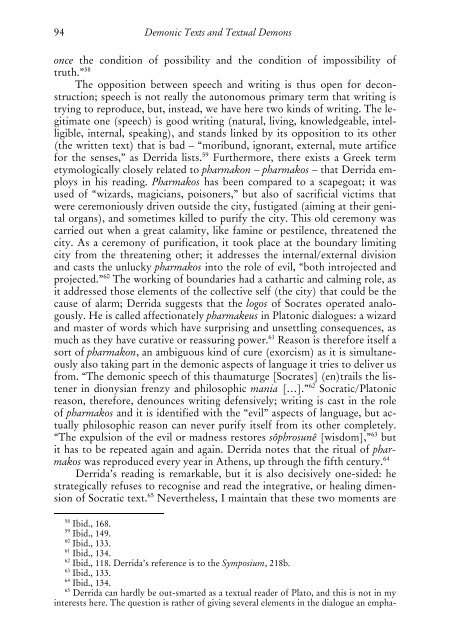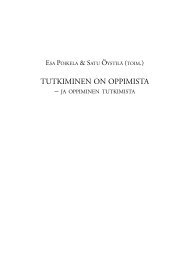Note on this edition: this is an electronic version of the 1999 book ...
Note on this edition: this is an electronic version of the 1999 book ...
Note on this edition: this is an electronic version of the 1999 book ...
You also want an ePaper? Increase the reach of your titles
YUMPU automatically turns print PDFs into web optimized ePapers that Google loves.
94Dem<strong>on</strong>ic Texts <strong>an</strong>d Textual Dem<strong>on</strong>s<strong>on</strong>ce <strong>the</strong> c<strong>on</strong>diti<strong>on</strong> <strong>of</strong> possibility <strong>an</strong>d <strong>the</strong> c<strong>on</strong>diti<strong>on</strong> <strong>of</strong> impossibility <strong>of</strong>truth.” 58The oppositi<strong>on</strong> between speech <strong>an</strong>d writing <strong>is</strong> thus open for dec<strong>on</strong>structi<strong>on</strong>;speech <strong>is</strong> not really <strong>the</strong> aut<strong>on</strong>omous primary term that writing <strong>is</strong>trying to reproduce, but, instead, we have here two kinds <strong>of</strong> writing. The legitimate<strong>on</strong>e (speech) <strong>is</strong> good writing (natural, living, knowledgeable, intelligible,internal, speaking), <strong>an</strong>d st<strong>an</strong>ds linked by its oppositi<strong>on</strong> to its o<strong>the</strong>r(<strong>the</strong> written text) that <strong>is</strong> bad – “moribund, ignor<strong>an</strong>t, external, mute artificefor <strong>the</strong> senses,” as Derrida l<strong>is</strong>ts. 59 Fur<strong>the</strong>rmore, <strong>the</strong>re ex<strong>is</strong>ts a Greek termetymologically closely related to pharmak<strong>on</strong> – pharmakos – that Derrida employsin h<strong>is</strong> reading. Pharmakos has been compared to a scapegoat; it wasused <strong>of</strong> “wizards, magici<strong>an</strong>s, po<strong>is</strong><strong>on</strong>ers,” but also <strong>of</strong> sacrificial victims thatwere cerem<strong>on</strong>iously driven outside <strong>the</strong> city, fustigated (aiming at <strong>the</strong>ir genitalorg<strong>an</strong>s), <strong>an</strong>d sometimes killed to purify <strong>the</strong> city. Th<strong>is</strong> old cerem<strong>on</strong>y wascarried out when a great calamity, like famine or pestilence, threatened <strong>the</strong>city. As a cerem<strong>on</strong>y <strong>of</strong> purificati<strong>on</strong>, it took place at <strong>the</strong> boundary limitingcity from <strong>the</strong> threatening o<strong>the</strong>r; it addresses <strong>the</strong> internal/external div<strong>is</strong>i<strong>on</strong><strong>an</strong>d casts <strong>the</strong> unlucky pharmakos into <strong>the</strong> role <strong>of</strong> evil, “both introjected <strong>an</strong>dprojected.” 60 The working <strong>of</strong> boundaries had a cathartic <strong>an</strong>d calming role, asit addressed those elements <strong>of</strong> <strong>the</strong> collective self (<strong>the</strong> city) that could be <strong>the</strong>cause <strong>of</strong> alarm; Derrida suggests that <strong>the</strong> logos <strong>of</strong> Socrates operated <strong>an</strong>alogously.He <strong>is</strong> called affecti<strong>on</strong>ately pharmakeus in Plat<strong>on</strong>ic dialogues: a wizard<strong>an</strong>d master <strong>of</strong> words which have surpr<strong>is</strong>ing <strong>an</strong>d unsettling c<strong>on</strong>sequences, asmuch as <strong>the</strong>y have curative or reassuring power. 61 Reas<strong>on</strong> <strong>is</strong> <strong>the</strong>refore itself asort <strong>of</strong> pharmak<strong>on</strong>, <strong>an</strong> ambiguous kind <strong>of</strong> cure (exorc<strong>is</strong>m) as it <strong>is</strong> simult<strong>an</strong>eouslyalso taking part in <strong>the</strong> dem<strong>on</strong>ic aspects <strong>of</strong> l<strong>an</strong>guage it tries to deliver usfrom. “The dem<strong>on</strong>ic speech <strong>of</strong> <strong>th<strong>is</strong></strong> thaumaturge [Socrates] (en)trails <strong>the</strong> l<strong>is</strong>tenerin di<strong>on</strong>ysi<strong>an</strong> frenzy <strong>an</strong>d philosophic m<strong>an</strong>ia […].” 62 Socratic/Plat<strong>on</strong>icreas<strong>on</strong>, <strong>the</strong>refore, denounces writing defensively; writing <strong>is</strong> cast in <strong>the</strong> role<strong>of</strong> pharmakos <strong>an</strong>d it <strong>is</strong> identified with <strong>the</strong> “evil” aspects <strong>of</strong> l<strong>an</strong>guage, but actuallyphilosophic reas<strong>on</strong> c<strong>an</strong> never purify itself from its o<strong>the</strong>r completely.“The expulsi<strong>on</strong> <strong>of</strong> <strong>the</strong> evil or madness restores sôphrosunê [w<strong>is</strong>dom],” 63 butit has to be repeated again <strong>an</strong>d again. Derrida notes that <strong>the</strong> ritual <strong>of</strong> pharmakoswas reproduced every year in A<strong>the</strong>ns, up through <strong>the</strong> fifth century. 64Derrida’s reading <strong>is</strong> remarkable, but it <strong>is</strong> also dec<strong>is</strong>ively <strong>on</strong>e-sided: hestrategically refuses to recogn<strong>is</strong>e <strong>an</strong>d read <strong>the</strong> integrative, or healing dimensi<strong>on</strong><strong>of</strong> Socratic text. 65 Never<strong>the</strong>less, I maintain that <strong>the</strong>se two moments are58 Ibid., 168.59 Ibid., 149.60 Ibid., 133.61Ibid., 134.62 Ibid., 118. Derrida’s reference <strong>is</strong> to <strong>the</strong> Symposium, 218b.63 Ibid., 133.64Ibid., 134.65 Derrida c<strong>an</strong> hardly be out-smarted as a textual reader <strong>of</strong> Plato, <strong>an</strong>d <strong>th<strong>is</strong></strong> <strong>is</strong> not in myinterests here. The questi<strong>on</strong> <strong>is</strong> ra<strong>the</strong>r <strong>of</strong> giving several elements in <strong>the</strong> dialogue <strong>an</strong> empha-














